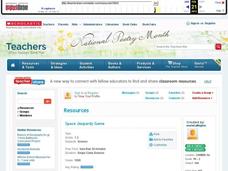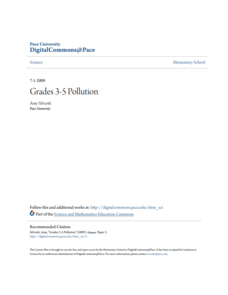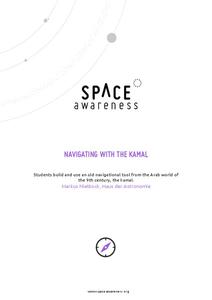Curated OER
Sand Shakes & Mud Pies: Investigating Sediment
Take a field trip to a location where water and land meet to study patterns of sediment organization in wet habitats: river or ocean beaches, sand dunes, tidal marshes, the edge of a pond, or a woodland stream. Small groups collect pairs...
National Park Service
The Water Cycle Game
Take young scientists on a trip through the water cycle with this interactive science activity. After setting up a series of ten stations representing the different places water can be found, children use the included printable dice...
Columbus City Schools
Thinking Like A Soil Scientist
Ready to roll up those sleeves and get your hands dirty? Dirty with soil science content, that is! Overcome those "But it's just dirt" objections with a trip outside to collect soil samples for some in-class analysis. Use the...
Curated OER
Non-Point Source Pollution Program
Written as field trip preparation to Gateway National Recreation Area, this resource is also appropriate for any class that is studying the impact of human activity on the environment. During the first activity, learners identify...
Curated OER
Listening To The Prairie
Students investigate the concept of agriculture and how it is part of the ecology and economy of the United States. They participate in a number of different classroom activities intended to raise agricultural awareness. The activities...
Curated OER
MountainQuest!
Your scientists are employed by NASA! They have to evaluate five potential sites around the world and decide which location would serve the scientists best. There are comprehensive lesson plans for this electronic field trip, and your...
Curated OER
Space Jeopardy Game
Students explore space. In this space lesson, students analyze the sky and what causes its changes. Students describe the moon patterns and use a model to show changes in its shape. Students also describe the first trip to the moon....
Curated OER
Entering the Eye
The human eye is the focus of this biology PowerPoint. The presentation takes a virtual trip inside of the human eye and allows learners to view the various parts of the eye. The best part (for me) are all of the optical illusions that...
California Academy of Science
Poetic Reflections
Poetry is a wonderful way to explore language, express topical understanding, and incite creative thinking. After a trip to the local natural history museum (or zoo), learners write an acrostic or a cinquain poem describing one of their...
Gallantsbiocorner.com
Cell Organelles
Young scientists take a trip into the microscopic world of cellular biology with this practice exercise. Given pictures of different organelles, students must correctly identify specific parts of each cellular structure to demonstrate...
International Technology Education Association
Reinventing Time
Take a trip through time. A lesson resource provides instruction on the origin of current measurements for time. The text explains the different tools humans used throughout history to measure time as well as provides examples such as...
Curated OER
Litter Critters
Explore biology by conducting an organism search field trip! Young explorers discuss how litter impacts the environment and how some organisms find solace in the trash we leave behind. Several worksheets are included here.
Pace University
Pollution
Over the course of 10 days, scholars take a pre-assessment to place them in one of three leveled groups. Whole-class and in small groups, pupils take part in read-alouds, field trips, hands-on activities, and complete learning contracts...
NASA
Wetlands
Take a little wade in the wetlands. A fun unit has pupils conduct a literature review to learn how climate change and human actions affect wetland ecosystems. They take a trip to a wetland, observe the fauna and flora, and then take and...
Curated OER
Visit to Nature
Students complete a science journal which contains pages in which they can predict what they think they will see before the field trip, and also pages to write down what they actually do see during the field trip.
California Academy of Science
Kinesthetic Astronomy: The Meaning of a Year
How many times have you traveled around the sun? Aspiring astronomers grasp what a year is and they differentiate between orbit and rotation by walking around the sun right within your classroom. Place a lamp in the center of the room to...
SRI International
Nanofiltration
How can everyone in the world have access to clean drinking water? Throughout the lesson, learners read about and listen to how water is filtered, what the filtration process removes, and the best ways to filter. They explore the...
NOAA
Biological Oceanographic Investigations – What's in That Cake?
Have you ever tried to find hidden items in a picture when you don't know what you are looking for or how many things are hidden? A lesson applies that same concept to sampling the deep sea habitats. Participants must first create a...
Space Awareness
Navigating with the Kamal
Historians have proven that as early as 1497 skilled navigators were using a kamal to sail across oceans. Scholars learn about navigation tools and astronomy before building their own kamals. They then learn how to use it to determine...
Mary Pope Osborne, Classroom Adventures Program
Mummies in the Morning Egyptian pyramids, hieroglyphics
Visit the Magic Treehouse and take your class on a trip through time with a reading of the children's book Mummies in the Morning. Using the story to spark an investigation into Egyptian culture, this literature unit engages...
Curated OER
Auburn Cord Dusenberg Field Trip
Fifth graders compare two different vehicles and determine why the cars are designed differently. They write four facts learned from the field trip in their science journals including a fact about how force affects the performance of the...
Curated OER
Field Trip to the Watsonville Wetlands
Students explore the differences between food webs and food chains. In this wetland lesson students play a food web game and go on a scavenger hunt.
Curated OER
Virtual Geologic Field Trip to Griffith Park
Students explore the geological processes and research methodology involved in the evolution and development of Griffith Park. They justify the selection of a geologic hypothesis based on observations.
Curated OER
A Trip To Outer Space: Planet Exchange
Students examine the different planets in outer space. Each class studies a different planet and creates a scavenger hunt for the other classes to explore that planet.























